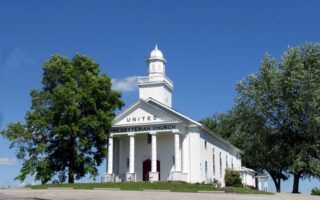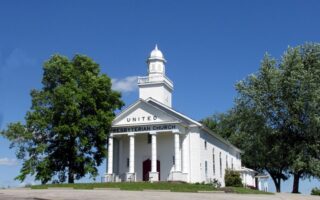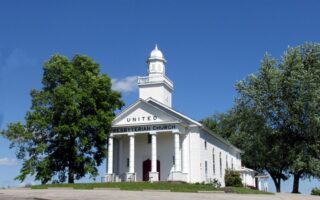Free Presbyterians are a denomination within Protestant Christianity that originated in Northern Ireland. They adhere to conservative theological beliefs and emphasize the authority of the Bible. While some Free Presbyterians identify as evangelical, it is important to note that not all Free Presbyterians consider themselves evangelical, as the term can have varying interpretations and associations within different Christian traditions.
Table of Contents
The History and Beliefs of Free Presbyterians
Are free Presbyterians evangelical? To answer this question, we need to delve into the history and beliefs of the Free Presbyterian Church. Established in 1951 in Northern Ireland, the Free Presbyterian Church has its roots in the Protestant Reformation and the Presbyterian tradition. With a strong emphasis on biblical authority and conservative values, the Free Presbyterians have often been associated with evangelicalism. However, it is important to understand their unique perspective and how they differ from other evangelical groups.
The Free Presbyterian Church was founded by the Reverend Ian Paisley, a prominent figure in Northern Irish politics and religious circles. Paisley’s vision for the church was to create a denomination that adhered strictly to the teachings of the Bible and resisted what he saw as the liberal drift of other Presbyterian churches. This commitment to biblical authority is a defining characteristic of the Free Presbyterian Church and aligns them with evangelicalism.
In terms of beliefs, the Free Presbyterians hold to the Westminster Confession of Faith, a historic document that outlines their theological positions. They affirm the doctrines of the Trinity, the deity of Christ, salvation by grace through faith, and the authority of Scripture. These core beliefs are shared by many evangelical groups and highlight the Free Presbyterians’ evangelical leanings.
However, there are some distinct beliefs held by the Free Presbyterian Church that set them apart from other evangelical denominations. One of these is their strong opposition to Roman Catholicism. The Free Presbyterians view Catholicism as a false religion and have been vocal in their criticism of its teachings and practices. This stance has sometimes led to tensions and conflicts with other Christian groups, including some evangelicals who advocate for ecumenical dialogue.
Another area where the Free Presbyterians differ from mainstream evangelicalism is their strict moral code. They hold conservative views on issues such as abortion, homosexuality, and gender roles. While these positions are not unique to the Free Presbyterian Church, their unwavering commitment to traditional values sets them apart from some more progressive evangelical groups.
Despite these differences, the Free Presbyterian Church shares many commonalities with evangelicalism. They emphasize personal conversion and the need for individuals to have a personal relationship with Jesus Christ. They also prioritize evangelism and mission work, seeking to spread the gospel both locally and internationally.
In conclusion, while the Free Presbyterian Church has its own distinct beliefs and practices, it can be considered evangelical in many ways. Their commitment to biblical authority, core theological doctrines, and evangelistic efforts align them with the broader evangelical movement. However, it is important to recognize their unique perspectives on issues such as Catholicism and morality, which may set them apart from other evangelical groups. Ultimately, the question of whether free Presbyterians are evangelical is a nuanced one, and it is up to individuals to decide how they define and understand evangelicalism.
Understanding the Evangelical Movement within Free Presbyterianism

Are free Presbyterians evangelical? This is a question that has been debated among scholars and theologians for years. To understand the evangelical movement within Free Presbyterianism, it is important to first define what it means to be evangelical.
Evangelicalism is a diverse movement within Christianity that emphasizes the authority of the Bible, the need for personal conversion, and the importance of sharing the gospel. It is characterized by a strong belief in the saving power of Jesus Christ and a desire to spread the message of salvation to others. Evangelicals also place a high value on personal piety and living a life that is pleasing to God.
Within the Free Presbyterian Church, there are varying degrees of evangelicalism. Some members fully embrace the evangelical movement and actively participate in evangelistic efforts, while others may have a more conservative or traditional approach to their faith. However, it is important to note that the Free Presbyterian Church as a whole is rooted in evangelical theology.
One of the key aspects of evangelicalism within Free Presbyterianism is the emphasis on the authority of the Bible. Free Presbyterians believe that the Bible is the inspired and infallible Word of God, and they strive to base their beliefs and practices on its teachings. This commitment to biblical authority is a central tenet of evangelicalism.
Another important aspect of evangelicalism within Free Presbyterianism is the belief in the need for personal conversion. Free Presbyterians believe that all people are sinners in need of salvation, and that salvation comes through faith in Jesus Christ. They emphasize the importance of a personal relationship with Christ and the need for individuals to repent of their sins and accept Jesus as their Savior.
The evangelical movement within Free Presbyterianism also places a strong emphasis on sharing the gospel with others. Free Presbyterians believe that it is their duty to spread the message of salvation to those who have not yet heard it. This can take many forms, including personal evangelism, mission work, and supporting ministries that focus on sharing the gospel.
While the Free Presbyterian Church as a whole is rooted in evangelical theology, it is important to recognize that individual members may have different levels of involvement in the evangelical movement. Some may be more actively engaged in evangelistic efforts, while others may focus more on personal piety and living out their faith in their daily lives.
In conclusion, the question of whether free Presbyterians are evangelical is a complex one. While the Free Presbyterian Church as a whole is rooted in evangelical theology, individual members may have varying degrees of involvement in the evangelical movement. However, the emphasis on the authority of the Bible, the need for personal conversion, and the importance of sharing the gospel are all key aspects of evangelicalism within Free Presbyterianism.
Examining the Relationship between Free Presbyterians and Evangelicalism
Are free Presbyterians evangelical? This is a question that has sparked much debate and discussion among theologians and churchgoers alike. In order to answer this question, it is important to first understand what it means to be evangelical and how this relates to the beliefs and practices of free Presbyterians.
Evangelicalism is a broad term that encompasses a range of Protestant Christian beliefs and practices. At its core, evangelicalism emphasizes the authority of the Bible, the need for personal conversion, and the importance of sharing the gospel message with others. Evangelicals also tend to place a strong emphasis on the death and resurrection of Jesus Christ as the means of salvation.
Free Presbyterians, on the other hand, are a denomination within the broader Presbyterian tradition. They trace their roots back to the Scottish Reformation and hold to the Westminster Confession of Faith as their doctrinal standard. Free Presbyterians place a strong emphasis on the sovereignty of God, the authority of Scripture, and the importance of living a holy and obedient life.
Given these definitions, it is clear that there are many similarities between free Presbyterians and evangelicalism. Both groups place a high value on the authority of the Bible and the need for personal conversion. Both also emphasize the importance of sharing the gospel message with others and living a life that is pleasing to God.
However, there are also some differences between free Presbyterians and evangelicalism. One key difference is in the area of worship. Free Presbyterians tend to have a more traditional approach to worship, with a focus on hymn singing, prayer, and the preaching of the Word. Evangelicals, on the other hand, may have a more contemporary style of worship, with the use of praise bands, multimedia presentations, and a greater emphasis on emotional expression.
Another difference is in the area of social and political engagement. Free Presbyterians have historically been known for their conservative stance on social issues, such as abortion and same-sex marriage. They have also been active in political campaigns and lobbying efforts to promote their values. Evangelicals, on the other hand, may have a wider range of views on these issues and may not be as politically active as free Presbyterians.
In conclusion, while there are certainly similarities between free Presbyterians and evangelicalism, there are also some differences. Both groups share a commitment to the authority of the Bible, personal conversion, and sharing the gospel message with others. However, free Presbyterians tend to have a more traditional approach to worship and may be more politically active on certain social issues. Ultimately, whether or not free Presbyterians are considered evangelical may depend on how one defines the term and the specific beliefs and practices of the individual or congregation in question.
Critiques and Debates Surrounding the Evangelical Identity of Free Presbyterians
Are free Presbyterians evangelical? This question has sparked numerous debates and critiques surrounding the identity of the Free Presbyterian Church. While some argue that they are indeed evangelical, others have raised doubts and questioned their adherence to evangelical principles. In this article, we will explore the various perspectives and shed light on this ongoing discussion.
To begin with, it is important to understand what it means to be evangelical. Generally, evangelicals are characterized by their emphasis on the authority of the Bible, the need for personal conversion, and the importance of sharing the gospel. They are known for their commitment to spreading the message of salvation through faith in Jesus Christ.
When it comes to the Free Presbyterian Church, there are those who firmly believe that they align with these evangelical principles. They argue that the church places a strong emphasis on the authority of the Bible and upholds its teachings as the ultimate guide for faith and practice. Additionally, they point to the church’s commitment to personal conversion and the belief in the necessity of being born again.
However, there are others who question the evangelical identity of the Free Presbyterians. They argue that the church’s strict adherence to certain doctrines and practices sets them apart from mainstream evangelicalism. For instance, the Free Presbyterian Church holds to a strict interpretation of the Westminster Confession of Faith, which some argue can be seen as exclusive and rigid.
Furthermore, critics argue that the Free Presbyterian Church’s stance on social issues, such as homosexuality and abortion, is at odds with the more inclusive and progressive approach of many evangelicals. They believe that the church’s strong opposition to these issues creates a divide between them and the broader evangelical community.
It is worth noting that the Free Presbyterian Church itself identifies as evangelical. They believe that their commitment to the authority of the Bible and the proclamation of the gospel aligns them with the evangelical tradition. They argue that their strict adherence to certain doctrines is a reflection of their desire to remain faithful to biblical teachings.
In response to the critiques, the Free Presbyterian Church acknowledges that they may have differences with other evangelicals on certain issues. However, they maintain that these differences do not negate their evangelical identity. They argue that the core tenets of evangelicalism, such as the belief in salvation through faith in Jesus Christ, are central to their faith and practice.
In conclusion, the question of whether free Presbyterians are evangelical is a complex and ongoing debate. While some argue that they align with evangelical principles, others raise doubts and question their adherence to certain doctrines and practices. Ultimately, the Free Presbyterian Church identifies as evangelical and believes that their commitment to the authority of the Bible and the proclamation of the gospel sets them apart. However, it is important to recognize that there are differing perspectives on this issue, and the debate surrounding the evangelical identity of the Free Presbyterians continues.
Conclusion
Yes, Free Presbyterians are generally considered to be evangelical.


